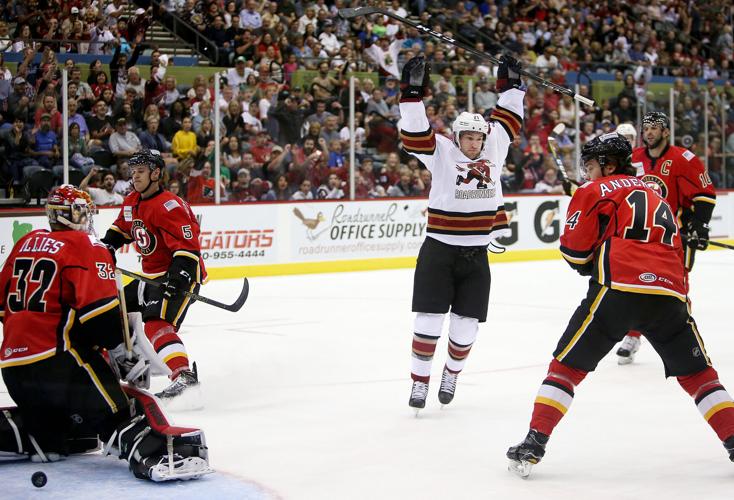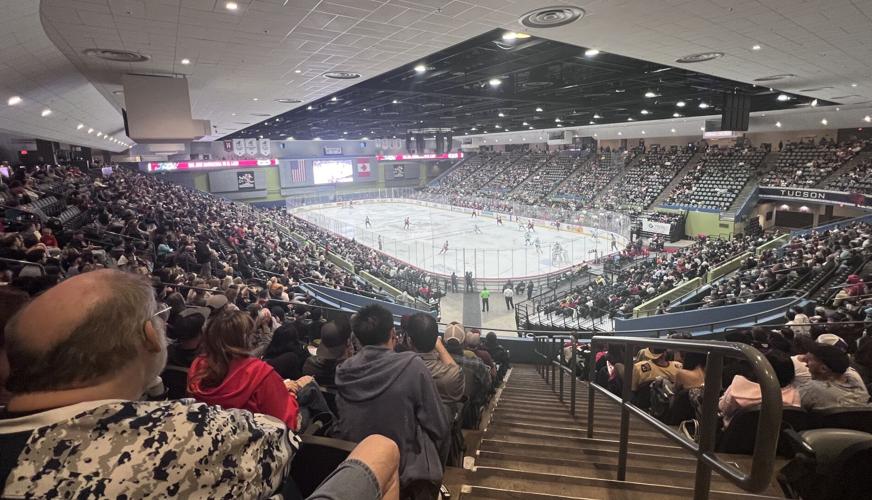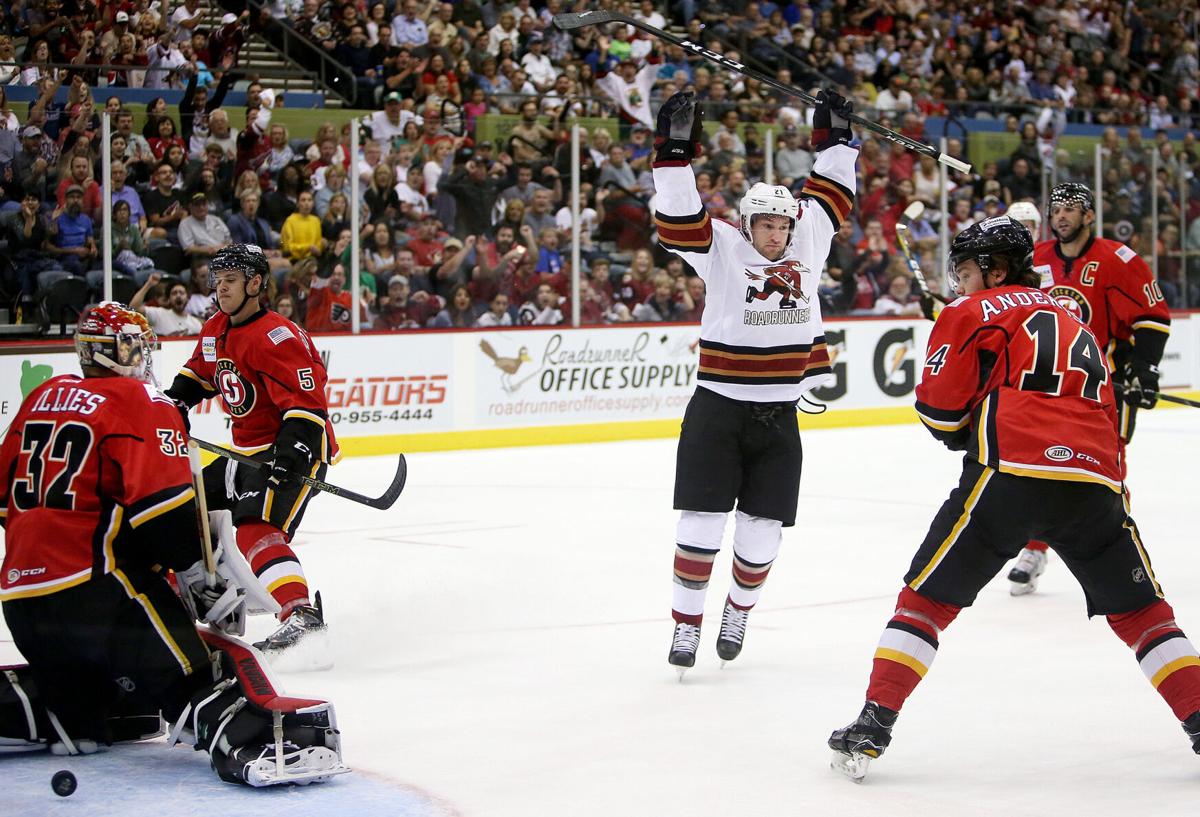The Lizards, the Gila Monsters, the Javelinas and the Scorpions didn’t last more than two seasons in Tucson. No money. No support. No go. The Rattlers? They were RIP in one year.
The Heat, the Thunder, the Flame and the Scorch were a fleeting part of Tucson’s sports landscape. No money. No support. No future. The Thunder Kats? They never got to the starting line.

Greg Hansen is the longtime sports columnist for the Arizona Daily Star and Tucson.com.
The Rustlers, the Gunners, the Icemen and the Mavericks had good intentions but none had a lifespan of more than a year. No money. No support. No way. The Mirage? They were just that, folding after two games.
By my count, 43 professional and amateur sports organizations outside of the University of Arizona have attempted to gain sunshine on Tucson’s picky sports stage the last 100 years.
Except for the 99-year-old Tucson Rodeo, La Fiesta de la Vaqueros, the inability to survive has been the story far more than success.
Remember the Tucson Sky, a championship-winning pro volleyball team? They were out of money and out of town in two years, with no place to display their 1979 championship trophy. The league folded and so, too, did the Sky.

Tucson Arena, the centerpiece of the 1971-built Tucson Convention Center campus downtown, hosted more than 4,100 Tucson Roadrunners fans per game over 36 home contests during the 2023-24 regular season.
Such has been the fate of the sports enterprises bold enough to attempt to find a home in this college town. Now, for better or worse, come the Triple-A Tucson Roadrunners, whose Southern Arizona future appears to be on life support.
The American Hockey League’s Roadrunners have endured eight seasons at the Arena, which makes them long-timers among the 43 pro and amateur Tucson teams. In many ways, the Roadrunners have broken the curse of Tucson’s century of sports failures. They averaged 4,123 fans during the AHL’s regular season, which is more than the Tucson Toros drew in any baseball season, 1969-90.
But now the Roadrunners are caught in an owner-created squeeze, with a future that could find them in Tempe or perhaps Salt Lake City or, as only the hockey gods know, nowhere.
The Roadrunners are one of the few pro sports ventures that have worked in Tucson.
Although they have an audience and an identity, no one’s getting rich off the Roadrunners. Their average gate ranks 25th of the 32 AHL teams; it’s not even half of the Coachella Valley Firebirds’ 8,844, located in the middle of nowhere in Southern California’s Palm Desert. But in a Tucson perspective, the Roadrunners are survivors. They’ve lived eight active, mostly successful years.

Kenny Lofton of the Tucson Toros holds up the 1991 Pacific Coast League championship trophy.
Do you know how many of Tucson’s sports enterprises have survived more than eight years?
The Tucson Amigos men’s soccer team made it 10 seasons, 1990-99.
FC Tucson men’s soccer organization, which has endured all manner of step-ups and step-backs, will soon enter its 14th season.
The Tucson Cowboys pro baseball affiliate had two lifespans: 1929-41, and again after World War II, 1947-58. But even Tucson’s history as a baseball town couldn’t save the Cowboys when attendance dipped below 800 per game in 1958.
And then there’s the Tucson Toros/Sidewinders, 1968-2008, which lived to the grand old age of 39 before the greed of the Arizona Diamondbacks doomed minor-league baseball and spring training in this town.
The Roadrunners have been battling to break a curse, or whatever you want to call it, that has infected almost every other for-profit sports enterprise in Tucson history.
The LPGA Tour was a vibrant part of Tucson’s sports landscape from 1980-2001. Annika Sorenstam won two championships on her home turf. Legendary Nancy Lopez won the inaugural LPGA Tour event in 1980.

Ex-Arizona Wildcat Annika Sorenstam won the Welch’s/Circle K Championship by six strokes in 2001, finishing with a 23-under par. It was the second-lowest score in LPGA history.
But then as if overnight, the LPGA bolted from Tucson in ’01 when one of its sponsors, Welch’s said it could no longer invest $800,000 per year in our golf tournament.
“We aren’t dead yet,’’ said Tucson Parks Foundation executive Stan Turley, but, alas, a tournament that had been sponsored by Circle K, Ping and Fry’s lost its pulse and hasn’t been back.
Such has been the life of Tucson’s sports enterprises not encamped near McKale Center.
The Cleveland Indians, which made Hi Corbett Field its spring training home from 1945-91, bolted for a better deal in Winter Haven, Florida. It didn’t matter that Mickey Mantle and Joe DiMaggio and Willie Mays had been part of our spring training history, the Indians became incensed that the Tucson City Council took them for granted as Hi Corbett Field became antiquated.
“Hank Peters, the Indians GM, once showed me around the facilities and it was like ‘you’ve gotta be kidding me,’ ‘’ remembers Tucson real estate executive Pat Darcy, a former MLB pitcher. “Tucson was never proactive in attempting to keep the Indians. It became the same with the (Colorado) Rockies, Diamondbacks and (Chicago) White Sox.’’

Hank Aaron of the Milwaukee Brewers gets a base hit during a Spring training game against the Cleveland Indians at Hi Corbett Field, Tucson, on March 23, 1975, a year after he broke Babe Ruth's home run record.
The lifespan of the Copper Bowl, played between Christmas and New Year’s at Arizona Stadium, was 10 years. Sponsors would come and go. Finally, in a deal with the devil, the Copper Bowl became owned by a Phoenix Group, insight.com., which moved the game to downtown Phoenix.
“The lure of a college football bowl game didn’t seem to be a priority for the people of Tucson,’’ said Shawn Schoeffler, part of the Fiesta Bowl group that ultimately absorbed Tucson’s first bowl game (the Arizona Bowl, with games on the UA campus eight of the last nine years, has valiantly filled that void of late).
But as with the Indians, Toros, the LPGA Tour, the PGA Tour, the Pro Bowler’s Tour, the Arizona Fall League, USA Baseball and the National Pro Fastpitch league, the Roadrunners may be limping toward a finish line.
A lot of this is self-inflicted by Tucson itself. Instead of building a sustainable baseball compound in downtown Tucson in 1997, politicians directed it to be built on Ajo Way. By whatever name, Tucson Electric Park is now a ghost town.

Tucson Sidewinders manager Chip Hale, left, yells as as Alberto Callaspo slides in to under the tag of Las Vegas' Edwin Bellorin during a June 21, 2006 game at Tucson Electric Park. That year's Sidewinders won both the Pacific Coast League championship and the Triple-A baseball championship, defeating the Toledo Mud Hens 5-2 in the Bricktown Showdown in Oklahoma City. Hale has since come full-circle, serving as head coach of the Arizona Wildcats baseball team in Tucson for the past three seasons.
When Tucsonan Jay Zucker sold the Sidewinders to a New Yorker in 2007 — one year removed from winning the Pacific Coast League championship — Sidewinders general manager Rick Parr told the Star: “This is a lethargic market. I don’t mind saying it. It is what it is.’’
The Sidewinders moved to Reno.
Now, the Roadrunners are on the clock. They’ve won two division titles and reached the AHL playoffs four times in eight years. Outside of UA sports, they’re about all we’ve got. Don’t call that moving van yet.
The Tucson Roadrunners close out their 4-3 win over the Colorado Eagles on Friday, April 12, 2024, at Tucson Arena. (Courtesy Tucson Roadrunners)
The Tucson Roadrunners close out their 2-1 win over the Colorado Eagles on Saturday, April 13, 2024, at Tucson Arena to clinch home ice for the first round of the upcoming Calder Cup playoffs (Courtesy Tucson Roadrunners)
VIDEO: An alternate, slow-motion view of Tucson Roadrunners forward John Leonard's penalty shot goal during a 3-2 win over the Calgary Wranglers on Wednesday, March 7, 2024 at Tucson Arena. (Courtesy Tucson Roadrunners)
VIDEO: Tucson Roadrunners forward Josh Doan buries a slick shootout goal goal during the' 4-3 shootout loss at the Henderson Silver Knights on Friday, March 1, 2024 in Henderson, Nevada. (Courtesy Tucson Roadrunners)











